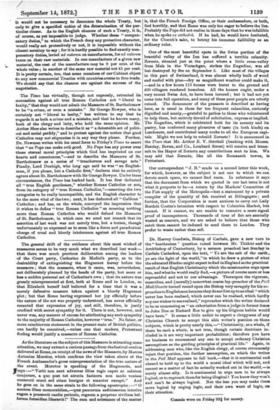Dr. Harvey Goodwin, Bishop of Carlisle, gave a new turn
to the" heathenism" question raised between Mr. Thakfir and the Archbishop of Canterbury, by a sermon preached last Sunday in Carlisle Cathedral, upon the text, " Ye are the salt of the earth, ye are the light of the world," in which he drew a picture of what the educated Hindoo might expect to find in England as the practical result of that English Christianity which the missionaries urge upon him, and what he would really find, —a picture of course more or less reproachful and not to our advantage. Thereupon the vigorous, masculine, and (morally) somewhat coarse lay-preacher of the Pall Mall Gazette turned round upon the Bishop very savagely for his re- proaches to Englishmen because they do not live up to an ideal "which never has been realised, which never can be realised, which hardly anyone wishes to see realised," reproaches which the writer declared to be as unmeaning as "an exhortation from a judge in former times to John Doe or Richard Roe to give up his litigious habits would have been." It seems a little unfair to expect a clergyman of any Christian Church to accept this able writer's position on these subjects, which is pretty nearly this,—" Christianity, as a whole, if there be such a whole, is not true, though certain doctrines in- cluded in it are very important probabilities ; therefore you have no business to recommend any one to accept ordinary Christian assumptions as the guiding principles of practical life." Again, in addressing men who, like the English clergy, of course strenuously reject that position, the further assumption, on which the writer in the Pall Mall appears to fall back,—that it is sentimental and absurd to hold up to the world a moral ideal which will not, and cannot as a matter of fact be actually worked out in the world,—is surely almost silly. Is it sentimental to urge men to be always logical, or to reproach them for being illogical? You know they won't and can't be always logical. Not the less you may make them more logical by urging logic, and their own want of logic, on their attention.


































 Previous page
Previous page